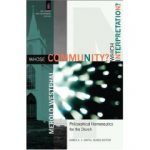Westphal, Merold. Whose Community? Which Interpretation? Philosophical Hermeneutics for the Church. Baker Academic, 2009. ISBN: 978-0-8010-147-2
Merold Westphal is distinguished professor of philosophy at Fordham University, where he has taught for more than twenty years. He has written many books including Onto-Theology and Levinas and Kierkegaard in Dialogue. For a more complete listing of his writings, lectures and research interests, view Westhphal’s curriculum vitae.
Book Basics
This book is the latest edition to Baker Academic’s The Church and Postmodern Culture series, which features high-profile theorists in continental philosophy and contemporary theology writing for a broad, non-specialist audience interested in the impact of postmodern theory on the faith and practice of the church. (Previously, I reviewed GloboChrist: The Great Commission Takes a Postmodern Turn.)
 Westphal writes a book that challenges the assumption that the only postmodern options are hermeneutical despair (anything goes) and hermeneutical arrogance (we have “the” interpretation). More specifically, he leverages Hans-Georg Gadamer’s Truth and Method as the starting point for an alternative that is relativistic, but far more bounded than the anything goes mentality often associated with relativism. The first five chapters set the stage by giving the reader background, the sixth through ninth chapters focus on Gadamer, and chapters nine through twelve offer some ideas as to how this looks in practice (including a case study format for the eleventh chapter).
Westphal writes a book that challenges the assumption that the only postmodern options are hermeneutical despair (anything goes) and hermeneutical arrogance (we have “the” interpretation). More specifically, he leverages Hans-Georg Gadamer’s Truth and Method as the starting point for an alternative that is relativistic, but far more bounded than the anything goes mentality often associated with relativism. The first five chapters set the stage by giving the reader background, the sixth through ninth chapters focus on Gadamer, and chapters nine through twelve offer some ideas as to how this looks in practice (including a case study format for the eleventh chapter).
While it is impossible to adequately summarize this dense and helpful volume succinctly, perhaps the following quote will entice would be readers to explore the book: “The implications for biblical interpretation are clear. If, as Gadamer argues, every translation is an interpretation and, conversely, every interpretation is a translation, that is, carrying meaning from one context to another, then every theology is a translation. Accordingly, it would be foolish to claim that there is one ‘definitive’ theology that is right while all the others are wrong (though theologies, like other interpretations/translations, can be wrong. Rather, it would be wise to consult a variety of the ‘best’ theologies if we want to understand the Bible and ultimately its subject matter: God and our relation to God” (p. 107).
So What?
How we interpret the Bible, hermeneutics, matters.
Are you aware not only of the way you interpret (i.e. reliance upon certain methodologies), but also how modernity informed and informs your interpretation?
For those who are younger and/or teach, mentor or minister alongside young adults, teens and children: How do you teach biblical interpretation to postmodern people? (Before teaching others, how do you approach the discipline of postmodern biblical hermeneutics?)
